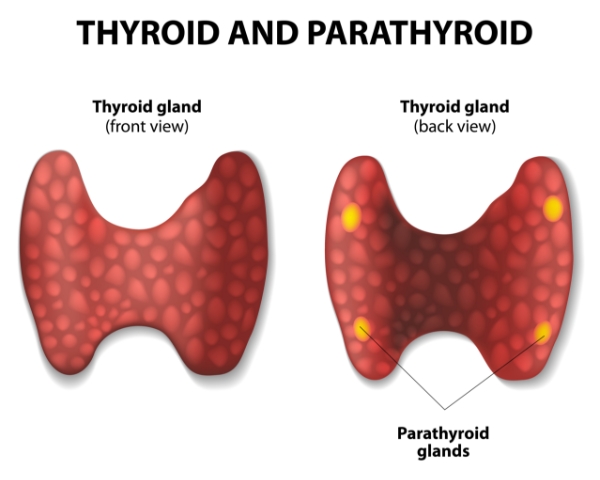PARATHYROID DISEASE

Parathyroid disease occurs because of some problem with one or more of the four parathyroid glands. Even though they are located in close proximity to the thyroid, they are not related. Parathyroid disease can either be cancerous or non-cancerous (benign).
Parathyroid Gland
The parathyroid gland is made up of four small glands (the size of a kernel of corn) behind the thyroid gland. These glands make parathyroid hormone (PTH), which controls the levels of calcium and phosphorus in the blood, helps the body make vitamin D and helps prevent the loss of too much calcium in the urine.

Types of Parathyroid Disease
Types of parathyroid disease include:
Hyperparathyroidism. In this case, a benign tumor on the parathyroid causes the parathyroid to make too much PTH, which can result in too much calcium in the blood (hypercalcemia). Having too much calcium in the blood can cause osteoporosis and kidney stones.
Parathyroid Cancer. This cancer is extremely rare, affecting only 1 out of every 2 million people. When it does occur, cancer progresses slowly and patients usually have very high PTH levels. It also often comes back after treatment, returning at the original site in 36% to 80% of patients anywhere from 1 month to 19 years after it was first treated. Controlling calcium levels in the blood can help people have longer disease-free periods between recurrences.
Hypoparathyroidism. In this instance, the body does not make enough PTH and the calcium level in the blood is too low. This condition is often caused by neck surgery or damage to the parathyroid glands.
Symptoms of Parathyroid Disease
In the early stages of disease, a person may not experience any symptoms. When symptoms do arise, they can vary depending on the type of disorder.
Hyperparathyroidism Symptoms
- Low Energy
- Fatigue
- Loss of appetite
- Muscle weakness
- Bone or joint pain
- Constipation
- Anxiety or depression
- Kidney stones
- Bone loss
- Broken bones
- Hypertension
Parathyroid Disease Symptoms
- A lump in the neck
- Difficulty speaking or swallowing
- Muscle weakness
- Hypercalcemia (sudden increase n blood calcium levels)
- Fatigue, drowsiness
- Urinating more often than normal, causing you to be dehydrated or thirsty
- Bone pain and broken bones
- Kidney stones
- Constipation
- Depression
- Nausea and vomiting
- Loss of appetite
Hypoparathyroidism Symptoms
- Numbness, tingling
- Muscle cramps or spasms
Diagnosing Parathyroid Disease
Since diagnosing parathyroid disease can be challenging, it is important to see an expert who has a high level of experience recognizing it.
During your appointment, your ear, nose, and throat (ENT) doctor will ask you questions about your medical history and conduct a physical exam. Your ENT doctor will also order blood tests, urine tests, and imaging tests. Imaging tests may include a CT scan, MRI, ultrasound, x-ray, and bone density test. A Sestamibi scan may also be ordered. For this scan, a small amount of radioactive chemical is injected into a vein. If the parathyroid is overactive, the chemical will collect in the gland and show up brightly on a special camera.
Treatment for Parathyroid Disease
There are several treatment options available for parathyroid disease, including
Surgery. Surgical removal of the parathyroid gland may be indicated if there is a tumor in the gland. There are many different techniques that can be used to remove the diseased parathyroid gland(s) including an open procedure, or a minimally invasive procedure using a fiber optic scope.
Radiation Therapy. Radiation therapy techniques are used to target tumors, delivering the maximum amount of radiation with the least amount of damage to healthy cells.
Medicine. Medication can be prescribed to reduce parathyroid hormone and control levels of calcium in the blood.
Contact Us
If you have concerns about your parathyroid health, contact Integrated ENT today at
(303) 706-1616 to schedule an appointment with one of our parathyroid specialists. You may also request an appointment online.







